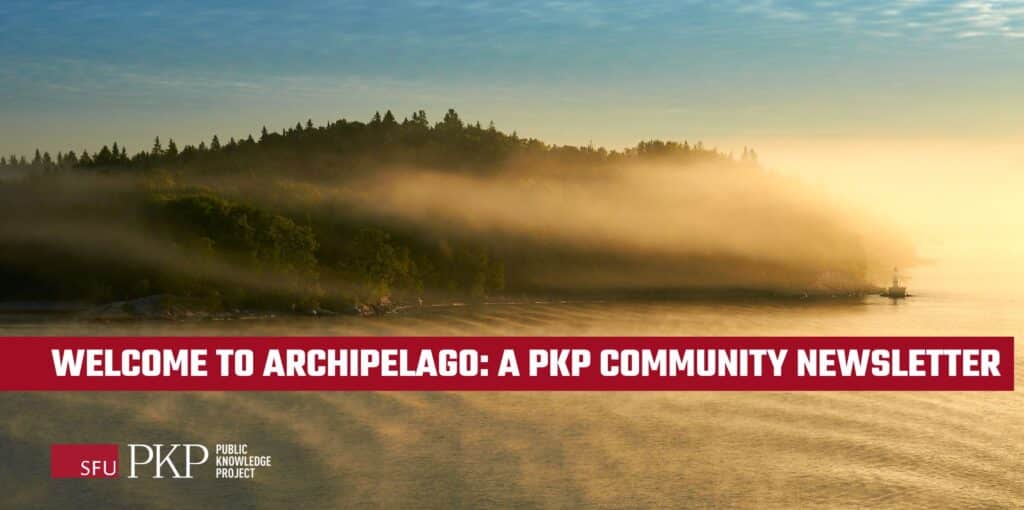Welcome to PKP’s Community Newsletter, Archipelago!

Welcome to “Archipelago”, a PKP Newsletter. This is the inaugural issue, featuring community and growth, what to expect in the newsletter, and a word on our chosen name.
Community and growth
It’s been an incredible 25 years for the Public Knowledge Project, filled with astounding growth within our team and across our global user community. We’re truly humbled by the journey.
Our Beacon data, which provides insights into the known public installations of PKP’s Open Journal Systems, Open Monograph Press, and Open Preprint Systems, has shed light on the impressive adoption of OJS as a preferred journal management and publishing tool.
Perhaps the most striking revelation from our 2020 Beacon data is that OJS has been instrumental in the publication of a staggering 5.8 million articles, distributed across 25,671 journals. Furthermore, according to the 2021 OA Diamond Journals Study, a remarkable 60% of surveyed Diamond Open Access Journals — those not charging fees to authors or readers — rely on PKP software. And, from more recent 2021 Beacon data, we learned that the number of journals supported by OJS has surged to nearly 34,000, published in over 156 countries, in more than 60 languages.
These statistics underscore the vital role PKP plays as a foundational open infrastructure. It’s a role that has exceeded even our most optimistic expectations as a globally-distributed team.
None of this growth would be possible without our community. That is, PKP’s open infrastructure is not developed by PKP alone, but rather, is driven by our global partner and user communities. PKP and the international community have cultivated a diverse, international collective that benefits from its platforms and research around scholarly communication.
When we talk about our community, we’re not just referring to numbers and statistics related to the use of our free and open-source software. It’s so much more than that. Our community encompasses the users who make the most of our publishing platforms, the generous financial contributors, development partners, and strategic partners who sustain and enhance our operations, the dedicated individuals who serve on our various interest groups and committees, our volunteer community translators, code contributors, documentation writers, as well as the academic communities and the wider public that support making global knowledge production more readily accessible.
We deeply appreciate your presence alongside us on this ongoing journey. Thank you for being an essential part of our vibrant PKP community.
What to expect
In our commitment to forge stronger connections within our extensive and dynamic community, we’re excited to introduce a quarterly community newsletter. This newsletter will include community-focused updates, featuring past and upcoming events, profiles of countries utilizing PKP Software, spotlights on valued community contributors, highlights from PKP-using publishers, upcoming enhancements to our software, and opportunities for community engagement.
Archipelago: A word on our name
If you’ve spent any time around me in the last couple of months, you’ve likely been privy to my fervent quest for the perfect name for PKP’s Community Newsletter. Anything valued deserves a good name! Thank you for your patience and graciousness in entertaining my suggestions, even the worst ones, which I dare not repeat here. I owe thanks not only to my colleagues at PKP but also to our friends at Crossref and anyone else I might have approached during this time.
It was during the pre-conference workshop on Diamond Open Access in Europe and Beyond, led by Vanessa Proudman (SPARC Europe) at LIBER’s 2023 conference, when the perfect name fell into my lap. Vanessa, along with Johan Rooryck (cOAlition S), and Pierre Mounier (OPERAS), poignantly articulated the Diamond OA landscape, describing it as an archipelago — a collection of federated, independent, and aligned institutions. It’s worth noting that the term “archipelago,” in this context, was introduced by Matteo Ciastellardi and colleagues when they published “Knowledge Isles in an Open Access World: The Open Archipelago Project” (2010). Later, the term was used in the OA Diamond Journals Study (pages 2 and 45), in which the aforementioned LIBER Conference participants were actively involved.
We recognize that the term “archipelago” can carry contested connotations when it comes to our collective efforts to enhance access, quality, and diversity in scholarly publishing. Does “archipelago” symbolize connectivity and closeness, or does it suggest isolation?
For us at PKP, “archipelago” embodies both the reality of distributed efforts, and a promising potential for greater collaboration across communities united by shared aims and values. It acknowledges that an archipelago is not a single island, but rather a collection of islands, each with the potential to establish connections or maintain sovereignty as needed.
“Archipelago” signifies our potential as a distributed open infrastructure, existing in a space where our significance and capacities are shaped by the other entities surrounding us. “Archipelago” represents not only what distinguishes us and our unique contributions, but also our shared values. At PKP, we embrace the concept of archipelago for the potential it holds in uniting us through purposeful and considerate actions, and in generating community connections dedicated to a common vision for the global public good.
Jump to other sections of this issue
📌 Celebrating 25 years and collaborating for the future
📌 Country feature: ORCID and OJS in Indonesia
📌 An update to PKP Member structure
📌 PKP announces new Development Partnership with Sachsenkonsortium
